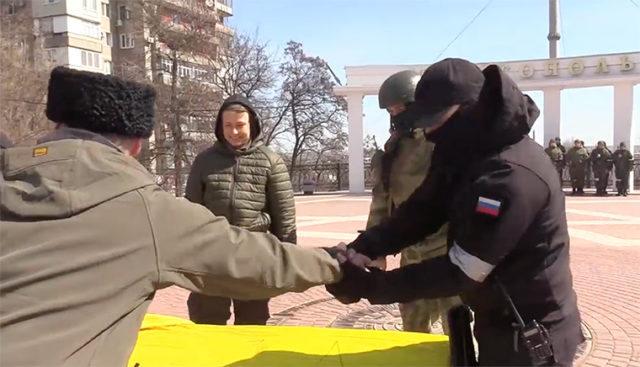
Cossacks and the Battle for Donbas
Publication: Eurasia Daily Monitor Volume: 19 Issue: 59
By:

Given the ostensible ties of Cossacks to the Don region, one might reasonably expect Russia’s state-organized Cossack movement to play a significant role in the battle for Ukrainian Donbas. And indeed, such expectations were borne out in a new report that “in recent times, in the region of the special military operation [the Kremlin’s euphemistic term for the war in Ukraine], are two Cossack regiments and some battalions.” According to a statement published on the website of the state-backed Russian Cossacks, “around 4,000 Cossacks from every Cossack society and organization of Russia are fighting together alongside soldiers of the Russian army.” The article specifically mentions the Cossack regiment named for Ataman Platov, the Kuban battalion bearing the name of Chepegi, as well as the 1st Crimean battalion. The cited number of Cossack fighters in Donbas represents an increase from the beginning of the month, when, allegedly, “1,400 Cossacks participated in military activities.” And that number is apparently set to grow “in the nearest term” to 5,500, representing three more Cossack detachments joining the battle (Vsko.ru, April 21).
Two of the most celebrated Cossack paramilitary units, the Don and Tavrida detachments, have already been “participating in the special operation for the demilitarization and denazification [sic] of Ukraine.” Ataman Nikolai Doluda, from the All-Russian Cossack Society, said of the Don and Tavrida fighters, “I saw the strength of the Cossack spirit, the unwavering faith in our country, Fatherland, and commitment to the urgent release of Ukraine from neo-Nazi spirits and Banderites. The systematic conduct of military field training and exercises have yielded results. I am confident in the Cossacks. They are military professionals, but most importantly, their Cossack spirit cannot be broken” (Vsko.ru, April 13).
This increased numbers of Cossack volunteers—most of whom are not professional soldiers, despite Doluda’s claims—being deployed to the battlefield suggests a growing desperation on the part of the Russian Armed Forces to meet personnel shortages. Cossacks from ever further afield are being mobilized and moved to the front lines. In preparation for the battle, a unit of Cossack volunteers from Orenburg Oblast “who expressed a desire to help in ensuring public order and protecting infrastructure in the liberated territories of Donbas” traveled to the region. Of the departing unit, Cossack general Sergei Nikolaevich Slepov said “volunteers in Orenburg received all the necessary equipment and uniforms, which were purchased through the fund for the development of the Orenburg Cossacks. The necessary material and technical support was provided by the government of the Orenburg region” (Vsko.ru, April 12). With substantial Cossack forces coming from deep inside Russia, the Kremlin’s pretense about the nature of the “special military operation” is becoming more and more strained.
Meanwhile, there has also been growing criticism about the course of the war, coming from Cossack sources and representatives. For instance, an interview with doctor of military science Konstantin Sivkov led to the observation that “our society is very concerned that a shameful peace may be signed with [Ukrainian President Volodymyr] Zelenskyy, with neo-Nazis.” The Russian regime, it seems, is trapped in a conundrum of its own making—having conjured an enemy with whom there can be no peace. Cossack complaints have additionally related to the military strategy. Sivkov asks why the war has been prosecuted so incompetently, specifically “who prevented us from leaving limited contingents of troops in all occupied territories and providing support, preventing any attempts to strike at [the Russian army as it advanced]?” Calling on Russia to reject the proposed peace negotiations in Istanbul earlier this month, he claimed that “if such a peace is concluded, it will mean a revolutionary situation has developed in Russia” that will generate three forces: “First, angry people. The second force will be representatives of the ‘fifth column’ who plot against the president [Vladimir Putin] until he is overthrown. The third force will be those returning from the fields of battle and the enraged army from whom victory was stolen.” Sivkov went on to predict a revolution and civil war, which would lead to a dictatorship in which treacherous elements would be persecuted (Kazak-center.ru, April 8).
Cossacks from the “free” or ancestral part of the Cossack movement (that is not officially recognized by the state) have also criticized Russian strategy in Ukraine. An article by Vadim Rybin, for instance, questions why Russia is participating in Turkish negotiations when Turkey has demonstrated “hostility” to Russia, such as by closing the Bosporus and supplying lethal aid to Ukraine. Indeed, “the hostile action of the Turkish government prevents Russia from replacing the cruiser Moskva, which sank in battle,” notes one commentary on a prominent “free Cossack” online portal (Allcossacks.ru, April 20). Another notably asserts, “Apparently, we will never know the truth [about the sinking of the Moskva] just as we do not know the truth of the Kursk submarine disaster [in August 2000]. The loss of the Moskva is a tragedy that overshadows even [the Kursk] tragedy… Now everyone is talking about it, but no one wants to ask the main question in this tragedy: who planned and sent a cruiser to patrol in an area 70 kilometers from Odesa?” (Allcossacks.ru, April 20). Thus, while the state-organized Cossack movement is being deployed to Donbas, even the loyal “ancestral” Cossacks are increasingly questioning the official narratives about the ongoing war, demanding accountability for the bountiful examples of the Russian authorities’ incompetence in the “special military operation.”



